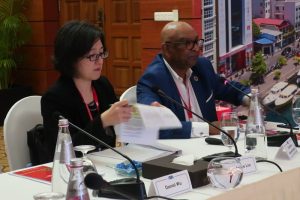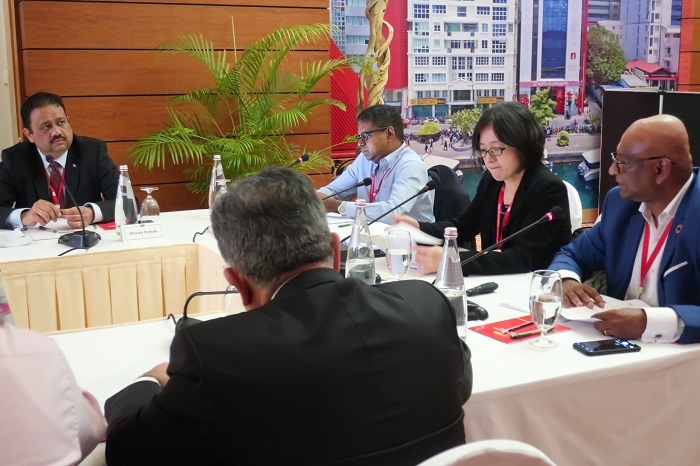South/Southeast Asian ‘Business Society Models’ focusing on sustainable SMEs - Exploring the Social Enterprise Ecosystem
(1) Business is a social phenomenon. Therefore, businesses are connected to society and, as many researchers have found, there exist business-society models as opposed to pure economic models. In recent years, the role of business-society models in sustainable development has attracted growing attention. There has also been sustained interest in the role of social enterprises in pro-poor development processes. However, less attention has been paid to, either in research or in the execution of banking in practice, how, within local ethno-religious traditions, business and social interests often co-produce each other – that is, how local cultures of entrepreneurship may have positive economic and social effects in terms other than those imagined by global development discourses. This is a serious consideration that must be taken when supporting sustainable development through financial intermediation.
 (2) Learning how business society models can emerge from local context offers new ways of thinking to the banking industry in order to lead sustainability in society and the environment. Sustainability in society has a major role in peace-building. However, this aspect of the existence of business-society models that can connect the dots to peacebuilding in multi-ethnic and multi-cultural economies has been often ignored by the banking industry at the policy and services delivery levels. However, the banking industry in the extremely diverse Asian context has an ethical responsibility to consider the functions of business-society models that builds business value chains over relationships across diversities that contribute to building resilient economies locally and nationally.
(2) Learning how business society models can emerge from local context offers new ways of thinking to the banking industry in order to lead sustainability in society and the environment. Sustainability in society has a major role in peace-building. However, this aspect of the existence of business-society models that can connect the dots to peacebuilding in multi-ethnic and multi-cultural economies has been often ignored by the banking industry at the policy and services delivery levels. However, the banking industry in the extremely diverse Asian context has an ethical responsibility to consider the functions of business-society models that builds business value chains over relationships across diversities that contribute to building resilient economies locally and nationally.
(3) Research findings on Sri Lanka have suggested that it is the ethnic-religious orientation of some business-society interventions that confer on business owners an ethics of engagement, which simultaneously reproduce economic and spiritual/social value for benefactors and beneficiaries. This accounts both for the very high levels of business-society engagement found in Sri Lanka and for the unique ways in which economic challenges were responded to – for example, in expressly religious terms. However, ethnopolitical challenges associated with the Sri Lankan post-war context have also meant interventions risked reproducing or generating social, political, and economic conflict. Despite this, research highlights that the multiple ways of addressing complex economic development challenges that are found offer frameworks currently unrecognized in global business sustainability debates. Moreover, it is also found that debates around ‘liberal’ and ‘illiberal’ peace-building are complicated by the unexpected relationships that emerged between ‘state’ and ‘market’ actors in the Sri Lankan context.
(4) Sri Lanka presents a case for addressing sustainable development challenges in Asia. It is a reflection of sociocultural diversity in the business environment in Asia. Therefore, the previous findings in Sri Lanka about the importance of business-society models in achieving sustainable development can be ‘extrapolated’ to the large context of Asia. The financial intermediary industry in Asia has a moral obligation to take into account how social motives cohere to entrepreneurial motives to produce sustainable social and environmental impacts.
(5) How business- society models can support social and economic stability by building value chains over relationships across communities and cultures must be a concern for bankers in Asia in contributing to scale sustainable development. Especially, this concern must be transformed into a policy stance in the banking sector in Asia as growth in business without peace and stability in countries would not gain sustainable returns to the banking industry. This is a challenge today where bankers in Asia must develop and execute solutions to have due diligence on business-society models that strengthen business relationships, economic value and social and environmental sustainability when delivering financial intermediation.
 (6) In Asian economies SMEs are a creation of business-society models. With SMEs accounting for above 50% of industries in Asian countries especially, the developing economies with ethnic and cultural diversity have the power to sustain or destabilize societies. This very fact, in turn, provides an opportunity for the banking industry to explore the role of business-society models especially, in its primary business of lending in the context of business/entrepreneurial cultures for instance, shooting through with increasing wealth inequalities and polarization of communities along ethnic and religious lines which might destroy such wealth in the medium and long run.
(6) In Asian economies SMEs are a creation of business-society models. With SMEs accounting for above 50% of industries in Asian countries especially, the developing economies with ethnic and cultural diversity have the power to sustain or destabilize societies. This very fact, in turn, provides an opportunity for the banking industry to explore the role of business-society models especially, in its primary business of lending in the context of business/entrepreneurial cultures for instance, shooting through with increasing wealth inequalities and polarization of communities along ethnic and religious lines which might destroy such wealth in the medium and long run.
(7) Bankers must have good judgment and practices around socio-cultural diversity and equality as they relate to investment and entrepreneurialism in the corporate and SME sectors, the barriers to and facilitators of women and members of marginalized social groups as owners/managers, and the relationships between diverse entrepreneurs’ visions of and plans for achieving ethical, sustainable, and peaceful futures through market activities.
Objectives:
- Creating a Social Enterprise Ecosystem for Business Sustainability through the Business Society Model.
- Building up a thriving Social and Economic Communities through businesses support mechanism directly connected supply and value chain.
- Working on approaches to scaling SMEs to commercial sustainability through the business society model.
- Building capacity of the SMEs using the linkages and partnership with the Business Society Model.
- Achieving business sustainability through the linking the sustainability development goals (SDGs) and peace building through the Business Society Model.
The Presentation file can be accessed HERE.
Prepared for ABA by:
Chandula Abeywickrema
Special Advisor to ABA on Financial Inclusion
Chairman of Lanka Impact Investing Network
Chairman of CSR Lanka

